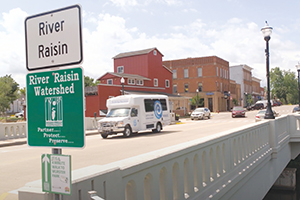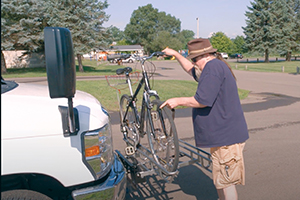By LISA EISENHAUER
A shuttle van that provides free rides to Chelsea, Michigan, for residents of two rural communities, both without a grocery store or pharmacy, got on the road this summer courtesy of St. Joseph Mercy Chelsea.

The WAVE shuttle bus funded by St. Joseph Mercy Chelsea in Michigan crosses the River Raisin bridge in Manchester. The free bus service combats isolation by transporting rural residents to services including groceries, pharmacies and restaurants.
The hospital is a joint venture between Saint Joseph Mercy Health System, a subsidiary of Trinity Health, and University of Michigan Health.
Nancy Graebner, the hospital's president and chief executive, said a community health needs assessment last year showed social isolation was one of the biggest concerns among people in the rural parts of the hospital's primary service area in southeast Michigan, including in the towns of Manchester and Stockbridge. Those towns' populations have stayed fairly stable in recent decades at about 2,200 for Manchester and 1,300 for Stockbridge. However, some businesses have vanished.
Stockbridge has no physician practices; Manchester has one primary care physician.

Graebner
"We've watched both communities lose basic services, such as access to a physician practice, primary care in particular, and then grocery stores for fresh foods, and a pharmacy," Graebner said. "Residents really do need to be able to travel to Chelsea to receive those types of services."
Unlike those towns, Chelsea has had a gradual rise in population in recent decades and now has about 5,500 residents. St. Joseph Mercy is the main hospital for the community and the surrounding region.
Widespread concern
The community health needs assessment that raised the red flag about social isolation in the rural communities indicated that the problem was widespread.

A rider loads his bicycle before boarding the WAVE shuttle bus. The bus got rolling this summer to provide transportation to residents of Manchester and Stockbridge, two rural communities in southeastern Michigan without grocery stores or pharmacies.
"A lot of people just assume social isolation due to transportation is probably among the geriatric community, but we found it was really crossing all demographics and one of the dominant areas actually was new moms who were feeling a little bit trapped with a newborn at home and not having a way to get out," Graebner said.
The hospital's Community Health Improvement Council decided the best way to address the isolation would be to provide a shuttle van for residents who lack their own transportation to get from the smaller communities to Chelsea, which is centered about 14 miles from each and has the services those communities lack.
The hospital's leaders contacted the Western-Washtenaw Area Value Express, a nonprofit commonly known as WAVE that exists to provide affordable transportation to older adults, persons with disabilities, and other transit-dependent residents of Washtenaw County, Michigan. Both Chelsea and Manchester are in that county; Stockbridge is just outside its borders in Ingham County.
Julia Roberts, executive director of WAVE, said the transit service's operators agreed the shuttle was a needed service, but it wasn't within WAVE's budget. "We could not have done this without the support of St. Joseph Mercy Chelsea," she said.
The hospital tapped its community benefit funds to donate $63,000 for a 12-seat van equipped with a wheelchair lift and added a bicycle rack and an outside wrap for the van with the logo of both the hospital and WAVE. The hospital is covering the $8,900 a month in operating costs expected for the first year. After that, the state is expected to pick up half.
Stalled by pandemic
Graebner said the shuttle service was a departure for St. Joseph Mercy Chelsea, which has traditionally used its community benefit funds for shoring up community programs such as food banks. "It was a big endeavor for us, more so than any other expenditure that we've done," she said.
The shuttle launch was set for April, but WAVE shut down all of its services when the pandemic hit. Over the summer, WAVE made COVID-safety adjustments to the van, including adding a plexiglass barrier between the driver and passengers.
The shuttle got rolling in August.
The van makes four round trips per day from Stockbridge to Chelsea on Monday, Wednesday and Friday and from Manchester to Chelsea on Tuesday and Thursday. It picks up riders at two shuttle stops in central locations in each town; disabled riders can arrange to be picked up at home. In Chelsea, the van stops at any desired drop-off point.
Lunch date
Graebner stressed that the shuttle is not just for health care appointments. "If these community members come to Chelsea and they want to be dropped off downtown so they can have lunch with a friend, or if they want to be dropped at the post office or the bank or the grocery store, the pharmacy, wherever they want to be, they can be dropped off and picked up as well," she said.
In Chelsea, riders can connect to bus lines to places like Ann Arbor, which is about 30 minutes away. Graebner said the shuttle's planners scheduled van service runs to ensure that the wait times for buses wouldn't be too long.
For now, riders must make reservations for the shuttle because occupancy has been reduced due to pandemic-related social distancing efforts. Once the virus is in check, riders will be able to just show up and hop on the shuttle at the designated stops.
Slowly catching on
Roberts said the shuttle is slowly gaining ridership. Among the regulars is someone with cognitive challenges who depends on the bus to get him to his job at a grocery store. "Typically for transit services in normal times it takes one to two, sometimes even three years to get up to full ridership," Roberts said. "We expect it to grow slowly given the pandemic," but the fact that there are riders every day is a really good sign.
Roberts said WAVE is planning to survey the communities to find out if tweaking its schedule or pickup points might draw more riders.
Even after the COVID pandemic is history, the shuttle will continue to pick up disabled riders at their homes or other locations of their choice. Because the communities are small enough that the addresses of most disabled residents could be identified, planners selected the central shuttle stops with the likely pickup points for those residents in mind.
Graebner said leaders and residents of Stockbridge and Manchester have expressed gratitude for the service. "That's just another example of if you listen to your communities, identify their needs and then partner with them to provide whatever the missing gap is, communities and health ministries can really come together and do some wonderful things," she said.